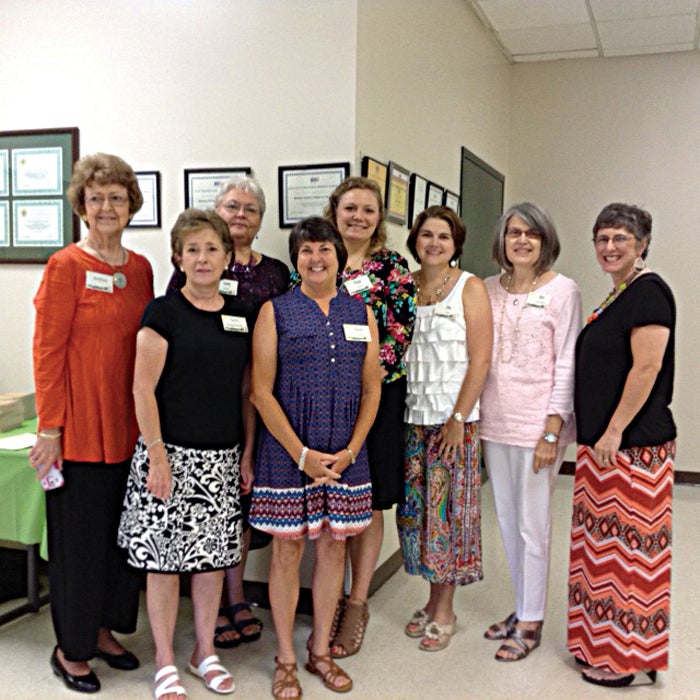People & Places Sunday, July 9
Published 12:00 am Sunday, July 9, 2017

- L-R back row: Guest Speaker: Betsy McSwain, Sandy Motley (Trading Ford), Peggy Connor (Sherrills Ford), Amy Beck (Milford Hills), Lucy Wilson (First Baptist China Grove) and Melodie Fleming (Find Your Way Church) Front row: Beth Herring (Stallings Memorial) and Karen Pinyon (Lake Community Church)
Senior Pastors’ Wives Honored
Submitted
The Baptist Women Leadership Team of Rowan Southern Baptist Association sponsored a luncheon for the senior pastors’ wives at the Julian Road Rescue Squad building on Saturday, June 24.
Jeannie Patterson, director of the leadership team, explains the purpose of the group is to facilitate both missions and ministry in not just our county, but our state, our nation and abroad.
“Knowing the role of a pastor’s wife is always challenging and often stressful, our ladies wanted to honor the pastors’ wives with a meal, some gifts, and a speaker just for them.
“In fact, Mrs. Betsy McSwain, formerly the pastor’s wife at Dunn’s Mountain Baptist Church and now the Women’s Missionary Union statewide ministry consultant for wives of Baptist clergy, brought a program on resources available to help the wives maximize their talents in their unique role.”
Stress ball sheep and Lindt chocolate sheep adorned the tables to illustrate the theme, “Ewe are special!” Fresh flowers on spring green tablecloths made the gourmet meal, catered by Mrs. Debbie Suggs truly festive.
The Baptist Women’s Leadership Team hopes to make this luncheon an annual event for the RSBA pastors’ wives.
Sloop Family Reunion
‘Bluecoats in Concord: the Untold Story’
Submitted
KANNAPOLIS — Kannapolis History Associates asks: Are you familiar with President Jefferson Davis’s journey to and through the South? Did you know that the Union Army was at one point in Concord? On Monday, July 10 learn more as Bill Hallman shares a chapter of local history involving the presence of the Union Army in Concord and surrounding areas.
7 p.m. July 10 in the A.l. Brown High School social room, 415 East First St. Park in lot East of Trinity UMC and follow the signs to KHA. call Phil Goodman at 704-796-0803 to learn more.
North Carolina Museums participate in Blue Star summer offer
North Carolina Museum of History, Mint Museum, Charlotte Museum of History, Old Salem and Reynolda House are just a few of the more than 2,000 museums across America to offer free admission to military personnel and their families this summer, Memorial Day through Labor Day, in collaboration with the National Endowment for the Arts, Blue Star Families and the Department of Defense.
In appreciation for their service to the country, active United States military, Reservists, National Guard, U.S. Public Health Commissioned Corps, NOAA Commissioned Corps, and their family members as defined by Blue Star Families guidelines can take advantage of this special offer through Labor Day, Sept. 4.
A full list of participating museums is available at arts.gov/bluestarmuseums
Reed Gold Mine presents ‘Gold as Currency’
Lecture and exhibit July 15
MIDLAND — Representatives from the Charlotte Coin Club will provide a free lecture regarding the use of gold as currency, with notes on the Bechtler mint and the history and output of the Charlotte mint on Saturday, July 15 at 1 p.m.
Most people are familiar with gold today through jewelry and special collector minted coins for investment purposes.
What people may not realize is the importance of gold to the monetary system of the United States from Colonial times through the 1930s. When the country was formed in the 1780s, foreign gold coins were freely traded for goods and services, since the denomination was stamped into the coin, and the value of gold was a set constant for trading or investment.
The United States Mint authorized gold coins to be made, in denominations of $1 to $20, at Philadelphia and other branch mints as they were opened in the gold producing regions.
North Carolina gold was the only gold used at Philadelphia from 1804-1827, showing the significance of this region. The first documented discovery of gold in the United States happened on John Reed’s farm in present day Cabarrus County.
Due to the amount of gold found in North Carolina, Christopher Bechtler began minting his own gold coins in Rutherfordton by the 1830s. Private mints flourished since gold coins were not easily accessible during this time in the south. A branch of the U.S. Mint was finally opened in 1837, producing coins until the Civil War began in 1861.
Gold coins continued to be issued by the U.S. Mint through the late 1800s and early 1900s. The final year for gold coins was 1933, which comprised the $10 Indian Head Eagle and Saint Gaudens $20 Double Eagle (though most of these coins were never released to the public). Franklin Delano Roosevelt, through Executive Order 6102, removed all gold coin and bullion from private hands, and eventually for backing paper money issued by the Federal Reserve Bank during 1933. The value of gold was also fixed at $35 per troy ounce, which stayed until gold could be privately owned again during the 1970s.
Paper money was also backed by gold, with Gold Certificates and early issues of the Federal Reserve Bank stating that fact on the notes. These were taken out of circulation in 1933, replaced with silver until the 1960s.
This free lecture is open for all those interested in numismatics and/or gold currency. Registration is encouraged but not required. RSVP at reed@ncdcr.gov by July 14.
For additional information, call 704-721-4653. Reed Gold Mine is located in southeastern Cabarrus County 12 miles southeast of Concord.




